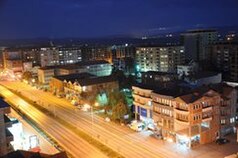Kosovo Polje
Kosovo Polje | |
|---|---|
Town and municipality | |
| Coordinates: 42°38′N 21°5′E / 42.633°N 21.083°E | |
| Country | Kosovo |
| District | Pristina |
| Villages | 18 |
| Government | |
| • Mayor | Burim Berisha |
| • Municipal | 83 km2 (32 sq mi) |
| Elevation | 543 m (1,781 ft) |
| Population (2024)[1] | |
• Municipality | 64,078 |
| Time zone | UTC+1 (CET) |
| • Summer (DST) | UTC+2 (CEST) |
| Postal code | 12000 |
| Area code | +383 38 |
| Vehicle registration | 01 |
| Website | kk |
Kosovo Polje (Serbian Cyrillic: Косово Поље, "Kosovo Field") or Fushë Kosova (Albanian indefinite form: Fushë Kosovë), is a town and municipality located in the District of Pristina in Kosovo. According to the 2011 census, the town of Kosovo Polje has 12,919 inhabitants, while the municipality has 33,977 inhabitants. The last official census tell’s that Kosovo Polje has 64,078 resident people.
Geography
Kosovo Polje is a municipality that lies in the center of the Kosovo Plain, with an area of 84 km2 (32 sq mi) and an altitude of 540 m (1,772 ft) above sea level.[2] The city is situated between Pristina in the east, Obiliq in the north, Gračanica in the south and Drenas in the west.[2] It consists of 16 settlements. It is located in the area of the intersection of roads important for transport, such as the railway connecting Kosovo Polje with Skopje and Mitrovica, which then connects to international roads.[2] Also, it is located at the intersection of important highways. The Pristina International Airport is also located on its territory.[2]
Climate
Kosovo Polje has a medium continental climate.[2] It is located in the Kosovo field, which is in the Ibri plain in the north and in the Llapi plain, in the north-east, open to northern continental climatic influences.[2] Winter is cold, while summer is warm and dry.[2] The Kosovo field, due to limitations with high mountains in the south and west, are deprived of the air masses of the Adriatic Sea and the Aegean Sea.[2] The coldest month is January while the warmest is August.[2]
History

In the municipality of Kosovo Polje lies the Harilaq Fortress. The fortress has a great archaeological importance, because its roots date back to prehistoric times while its peak development occurred during late Antiquity through the early Byzantine period.
Kosovo Polje was named after the Kosovo Field of the 1389 Battle of Kosovo. The settlement of Kosovo Polje was established in 1921 during the Kingdom of Yugoslavia (see Colonisation of Kosovo).[3]
In the city suburbs there is the Multinational Specialized Unit base. Part of KFOR, the unit is composed entirely by Italian Carabinieri.
Economy
There are two magnesium mines operating on the territory of Kosovo Polje: Goleš and Strezovce.
Demographics
Prior to the 1999 Kosovo War, the town of Kosovo Polje had, according to the figures of the Federal Statistical Office in Belgrade from March 1991, a total population of 35,570 inhabitants, while the ethnic makeup was 56.6% Albanian, 23.7% Serb and 19.6% from other communities.[4]
According to the last official census done in 2011, the municipality of Kosovo Polje has 34,827 inhabitants.
It is estimated by the Kosovo Agency of Statistics, that by the end of December 2020, the population of the municipality has grown to 39,948 inhabitants.[5]
| Year | Pop. | ±% p.a. |
|---|---|---|
| 1948 | 8,041 | — |
| 1953 | 9,288 | +2.93% |
| 1961 | 12,286 | +3.56% |
| 1971 | 20,889 | +5.45% |
| 1981 | 29,805 | +3.62% |
| 1991 | 35,570 | +1.78% |
| 2011 | 34,827 | −0.11% |
| 2024 | 64,078 | +4.80% |
| Source: [1] | ||
See also
References
- ^ "Population and housing census in Kosovo preliminary results - July 2024" (PDF). Retrieved 2 August 2024.
- ^ a b c d e f g h i "Plani Lokal i Veprimit në Mjedis 2012/2017" (PDF).
- ^ Pavlović, Aleksandar. "Prostorni raspored Srba i Crnogoraca kolonizovanih na Kosovo i Metohiju u periodu između 1918. i 1941. godine" (PDF). Archived from the original (PDF) on 2011-08-26.
- ^ Brunborg, Helge (14 August 2002). "Report on the size and ethnic composition of the population of Kosovo", p. 9. Retrieved February 9, 2015.
- ^ "VLERËSIM Popullsia e Kosovës 2021" (PDF).
External links
![]() Media related to Fushë Kosova at Wikimedia Commons
Media related to Fushë Kosova at Wikimedia Commons








